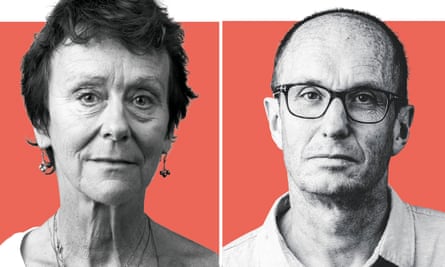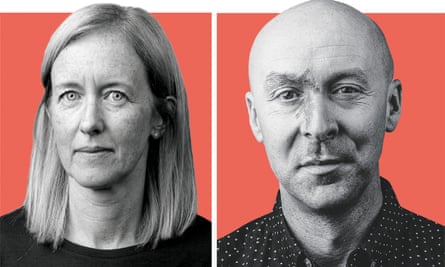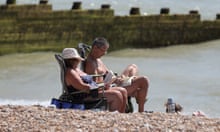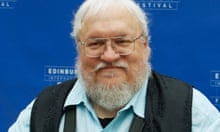Joyce Carol Oates once said that when writers meet and interrogate each other about their writing methods (how many hours a day, how many words a day, how much planning and how much editing, how many drafts, what magical-thinking rituals, computer or freehand, music or silence?), they are really just asking: are you as crazy as I am? For writing, solitary and obsessive, can often feel like going a bit mad. Philip Roth once described his methods: “I’m like a doctor and it’s an emergency room. And I’m the emergency.’”
There’s a small literary sub-genre of hybrid creatures who write together. And when they meet, the conversation isn’t just “how?” (how do you do it, how do you divvy up the tasks, how do you not quarrel bitterly?) but “why?”.
Sean and I have written psychological thrillers together under the name of Nicci French for nearly 25 years now – a quarter of a century of collaborating, of entering the other’s imagination and exploring the world together. Writing is hard; writing with another person is really, really hard. The argument with oneself becomes also the argument with the other, in a way that’s intimate and vulnerable and unexpected but also messy and complicated.
We had friends who, when our first novel, The Memory Game, was published, decided that they would also give it a go. They had the unwise idea of writing an erotic novel together and since he was the professional writer, she was given the task of supplying him with the sexual scenarios. With some reluctance, she did so; when he heard the first one, he promptly went into a massive sulk, they had an argument and the collaboration stopped before it had begun. Indeed, there’s something scarily self-exposing, wounding, even humiliating about passing a pulpy, half-formed text over to another person to edit, to change, to erase. To write with your partner is to find things out about their subconscious – possibly unwelcome things.
Over the years, we’ve met various other couples who write together. There were the ones who sit side by side at identical desks in a large and unsettlingly pristine study, discussing their work as they go, reading out excerpts. (We don’t do that.) The pair who write in a kind of frenzy, passing across half-finished passages for the other to finish. (We don’t do that.) Or the ones who write the same chapter simultaneously and decide which one works. (Absolutely not.) There’s the husband and wife who divide the book into “his” and “hers”, the male view and the female view alternating. Or the partnership in which he writes and she edits. Or the one in which only one of the pair does the publicity, becoming the visible face of this hidden process.
Now there’s a dynamic new arrival in this niche category of writers. Ambrose Parry’s The Way of All Flesh is set in an 1840s Edinburgh where new science and old beliefs rub shoulders. Its twisty gothic plot is based on grisly real events. The two main characters – a tormented apprentice doctor, Will Raven, and a spirited and clever housemaid, Sarah Fisher – lead the reader down dark alleys, through aristocratic parlours and prostitutes’ bedrooms, into secret worlds. The two of them look set to return again in future Ambrose Parry novels.
A couple of weeks ago, Sean and I met Ambrose Parry, who is actually two slender, quietly spoken, alert and endearingly modest people: Chris Brookmyre, the bestselling, prolific and highly regarded writer of “tartan noir” thrillers, and his wife, Marisa Haetzman. She worked for over 20 years as an anaesthetist, a profession that relies on meticulous precision, caution and control; now, she has launched herself into a writer’s life of solitariness and uncertainty.
“We have to do this,” says Sean. “But you’ve given up a real job. Why?”
“I did think: what am I doing?” Haetzman acknowledges. “It was fairly terrifying.” It was what Brookmyre calls an “exercise in faith”.
At first glance, it makes more sense for Sean and me. We both studied English (at the same time at the same university, though we managed not to meet each other). We both always wanted to write. By the time we met, we were in our 30s and were working as journalists. We pressed the books we loved on each other; we were each other’s first reader and editor and we had a repeated discussion about the possibility of collaborating that gradually hardened into a resolve, although it was always something that would always happen in the impossible future, when we had more money, more time, more space, when our life was less crazy. Cyril Connolly said the enemy of good art was the pram in the hall: we had prams and buggies and soft toys and balls and mismatched wellies and tricycles and wet towels and worrying stains. When we met, I had two tiny children, aged two and one, and we quickly had two more; our life was a rollercoaster of mess, noise, chaos, frantic business, exhaustion and love.
By contrast, Brookmyre and Haetzman met when they were just 17. They have been together for 33 years now; for 30 of those years, she has been the doctor, he the writer. When their son, who is now 18, was small, Brookmyre was the stay-at-home father. He could only go away on promotional duties on Mondays and Tuesdays. Their life had the boundaries and compartments that we’ve never had.
Over the hour-and-a-half that we spent together, drinking tea and talking (“do you do this too?”), similarities emerged and also differences. We both had a trigger that turned “one day” into “now”. For us, it was in 1994 when we stumbled across the recovered memory controversy. Were these memories of abuse as accurate as they seemed or could they be imaginary? It immediately felt like the basis for a new kind of thriller, a thriller inside the strange world of the human mind. Also, crucially, we thought that if we didn’t write about it, someone else would. (This turned out to be true: shortly after The Memory Game was published, we met a writer at a party who was rather cross with us, because he’d been halfway through his own recovered-memory novel when ours came out.)

For Brookmyre and Haetzman, the trigger was her MA in medical history. Her dissertation was on James Young Simpson, who was a maverick professor of midwifery in Edinburgh in the 1840s and through whose consulting room all levels of society passed. “Most history is written through the history of important people,” says Brookmyre. “But Simpson went into the poorest of houses as well as those of aristocrats. Culture, history and class intersected around one man.” Haetzman found his casebooks from 1847 and the stories she read – about the new use of chloroform, about midwifery practises, about the way the rich lived and the poor – make their way into The Way of All Flesh. “She had uncovered a diamond,” says Brookmyre.
At first, it was going to be Brookmyre’s book, with Haetzman supplying the research and the medical knowledge. “But Marisa had done all the work,” he says, “and she had perspectives I’d never be able to have.” And so Ambrose Parry came into being, although the novel had a few false starts – it was only when they found their two main characters, the male and female points of views, and when they realised it had to be a detective novel, that the pieces fell into place.
For all four of us, the kitchen table is central to the writing process. We don’t sit face to face, like in an interview or business meeting, but side by side. We drink coffee and tea and try to thrash out the plot, the characters, the voice, the beating heart of the book. It’s partly the painful process of finding out if your partner is as excited about an idea as you are. (Sometimes, Brookmyre will make what Haetzman calls “the Face”.)
Because Brookmyre was the experienced writer, Haetzman has had moments of powerful insecurity. “My early efforts were terrible,” she says. “I was afraid of looking ridiculous.” She read a great deal about the art of writing to help her with her uncertainty, including Elizabeth Gilbert’s book, Big Magic: Creative Living Beyond Fear, which told her that “unused creativity was not benign”. And for Brookmyre, his anxiety was about “dragging Marisa into this” – and then what if she had given up her job and it didn’t work? Being an anaesthetist is all about planning and control – “You have plan A, plan B, plan C and plan D before you even start,” says Haetzman – whereas writing is in part about ceding control, allowing uncertainty, risking failure over and over again. (“At least nobody dies when you get it wrong,” says Sean.) As Haetzman was told in her watercolour classes: “You have to lose the image and then find it again.” Or, as Brookmyre has it: “Be anxious but hold faith.”
Sean and I each do every bit of research a book will need, no matter who turns out to be writing a section; so in our Frieda Klein series, every inch of ground that Frieda walks, and she walks a great deal, we too have walked or cycled; everything she looks at we have looked at too. But Brookmyre and Haetzman are – for now anyway – using the rich seam of material that she found in her dissertation. They say they have only just scratched the surface of what she has discovered.
Like us, they never write together, because writing for all of us requires a kind of sinking beneath the censoring surface of the self into a place that can feel mysterious, even uncanny, and where you discover what you want to write by writing it, and find out where you want to go because the words lead you there. (Actually, Sean and I did try once, with the final chapter of The Memory Game, when we thought we should mark the fact that we had actually reached an ending. We sat together at a computer and for an unpleasant morning we argued over every word and sentence, wrote a wretched little paragraph, felt horribly self-conscious and hampered by the other, squabbled and at last ditched the endeavour.)
But whereas Sean and I work sequentially, one of us writing the first chapter, sending it to the other who is then free to add, edit, alter or rewrite, always trying to write into this third voice we have created, they will often write simultaneously. “Chris sort of directs things,” says Haetzman. “He’ll say, this scene is for you and this one is for me.” Then they’ll swap over and rewrite things if necessary. (The advantage of our method is that I can be lying in a hot bath or having coffee with a friend and Nicci French can still be hard at work.)
And whereas Sean and I never plan in advance who is going to write which bit (and one of our three rules is that we will never say who wrote what), Brookmyre and Haetzman tend to divide things according to whether a scene takes place from the perspective of the woman or the man: Haetzman usually writes Sarah’s chapters, Brookmyre writes Raven’s (though Haetzman provides him with the medical information he needs for the scenes of brutal labour and childbirth).
We all have our own rooms to write from. Brookmyre’s is “pristine, borderline OCD” – and often, he says, he doesn’t write from home anyway, but walks and talks into a recorder. He’ll do this at all hours and in all Scottish weathers, rain beating down on him. Haetzman, contrary to my expectations, has a study so piled with papers that it’s a “fire hazard”. I write from quite an organised attic and Sean, man that he is, has his shed, built in a place in the garden where the internet can’t find him. Sean is not neat. Books and mugs and bills and empty boxes and tangles of wire and ink cartridges and newspapers and magazines and cordless phones whose batteries have all run down lie about him.
And like us, they have one name on the jacket of their novel. One voice, one author. Ours doesn’t really need an explanation (Nicci Gerrard + Sean French = Nicci French: the female version of our two names, because the narrator of our first book was a woman). Ambrose Parry is more interesting. It comes from Ambroise Paré, who was a French military surgeon in the mid-16th century. The name evokes a past age and it’s also, they say, a bit androgynous.
The question Sean and I have been circling round is: do they argue? Do they mind when they have different ideas for what should happen? Do they mind when their precious words are changed or removed by the other? Do they mind feeling vulnerable, exposed, undignified, ridiculous? Do they mind that the old compartments of their lives have been demolished and now they are in the same boat, whatever the weather, and there’s nowhere to hide?
They look at each other, smile, shake their heads. There aren’t many disagreements, they say. And they share a vision and a passion.
“My problem,” says Haetzman, “is that of holding on to facts too much.”
“I’ll say, we’ll just make it up,” says Brookmyre. “We’re not going to get marked down by history. I used to be terrified of what colleagues might think if it wasn’t true.”
But what do they feel if the other deletes passages that they are proud of? “If you’re very attached to something, you’re allowed to keep it,” they tell me.
(Aha – that’s our second of three rules: if one of us removes something, the other is not allowed to put it back in. And also it brings in the third rule: we never sit down together and go over what changes have been made, like a teacher with a red pen saying the work isn’t up to scratch. That would be too painful. Instead, we edit the other’s work and simply email it back; from shed to attic, attic to shed. We lick our wounds in private.)

So Ambrose Parry is not a quarrelsome person and, indeed, there’s something democratic and impressive about the way Brookmyre and Haetzman interact. They wait for each other to reply to a question, never interrupt, listen to each other with interest and respect. She admits that when Brookmyre is working on his solo novels and she has to wait for him, she can feel impatient and anxious. It is very hard for her to have a day without purpose.
Yet they rarely argue. Sean and I do – or, at least, I argue and he becomes sorrowful and silent and walks with heavy shoulders. But our rows are like stupid, unseemly marital squabbling; we don’t fall out over the obvious things, in particular the rewriting of each other. (Although if I’d been told 30 years ago that I would hand my first drafts to a man who would proceed to rewrite them, I would have been startled and horrified.) Collaboration is about mutual trust: we have to trust this isn’t a power struggle, that we are each other’s best reader and editor, that, as in a marriage, you cannot win a battle. What we do as Nicci French we do for Nicci French.
Brookmyre and Haetzman’s collaboration is wonderfully logical. She is an expert about 19th-century medical behaviour and misbehaviour. She knows about the human body, what it’s like as it lives and dies. And he is an expert practitioner of crime fiction, how to make it, how to write it.
So we come away knowing why they write together. But why do we write together? We studied the same subject, we did the same job. So what’s the point? In a way, it’s as mysterious to us as to anyone. There’s a psychological phenomenon in which a couple get together and commit crimes they would never have committed separately. Think Fred and Rose West or – a little more glamorously – Bonnie and Clyde. When it works, we aren’t so much collaborating as spurring each other on, a bit further into the darkness, a bit closer to the edge of the abyss than we would have dared on our own. It’s not everybody’s recipe for a happy marriage, but it’s all we’ve got.
The Way of All Flesh by Ambrose Parry is published 30 August (Canongate, £14.99). To order it for £10.49 go to guardianbookshop.com or call 0330 333 6846. Parry will launch their debut at Edinburgh international book festival on 26 August. Day of the Dead by Nicci French (Michael Joseph) is out now










Comments (…)
Sign in or create your Guardian account to join the discussion